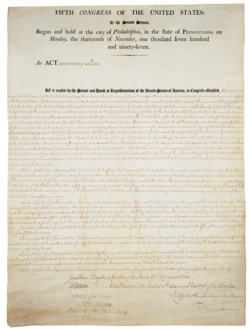
Back Lleis d'Estranxería y Sedición AST Alien and Sedition Acts Danish Alien and Sedition Acts German Leyes de Extranjería y Sedición Spanish Alien and Sedition Acts Finnish Alien and Sedition Acts French חוקי הזרים וההמרדה HE Alien and Sedition Acts Italian 外国人・治安諸法 Japanese Akta Hasutan dan Pendatang Asing (1798) (Amerika Syarikat) Malay
The Alien and Sedition Acts were a set of four laws enacted in 1798 that applied restrictions to immigration and speech in the United States.[a] The Acts were passed by a Congress controlled by the Federalist Party over the opposition of the Democratic-Republicans, the party typically favored by immigrants and political émigrés. The prosecution of Democratic-Republican journalists under the Sedition Act trials rallied public opinion against the Federalist administration of John Adams and contributed to the victory of the Democratic-Republicans in the elections of 1800. Under the new administration of Thomas Jefferson, only the Alien Enemies Act, granting the President powers of detention and deportation of foreigners in wartime or during threatened invasion, remained in force after 1802.
| Act | Purpose | Status |
|---|---|---|
| Naturalization Act of 1798 | To increase the requirements to seek citizenship. | Repealed in 1802. |
| Alien Friends Act of 1798 | To allow the president to imprison and deport non-citizens. | Expired in 1800. |
| Alien Enemies Act of 1798 | To give the president additional powers to detain non-citizens during times of war, invasion, or predatory incursion.[1] | This law, amended in 1918 to strike out the provision restricting the section to males,[2] is still in effect as 50 U.S.C. ch. 3. |
| Sedition Act of 1798 | To criminalize false and malicious statements about the federal government. | Expired in 1800. |

Against the backdrop of the undeclared Quasi War with the French Republic, the Federalists argued that the acts were essential to national security. Democratic-Republicans denounced the legislation as a tool of government repression and as a violation of First Amendment rights of free speech.
The surviving Alien Enemies Act has been invoked three times since 1800, in the course of major declared wars: the War of 1812, World War I and World War II. The law is best known for its partial role during the Second World War in the disproportionate Internment of Japanese Americans. (Most of the 120,000 people of Japanese descent incarcerated in U.S. internment camps were U.S. citizens detained solely on the basis of their Japanese ancestry, under the authority of Executive Order 9066 issued by President Franklin Roosevelt in early 1942. On a much smaller scale, order 9066 also enabled incarceration of U.S. citizens of German and Italian descent).
Following his second-term inauguration as President in January 2025, Donald Trump invoked the Alien Enemies Act to expedite the removal of non-citizens engaged in what he claimed was an organised criminal-gang "invasion" of the United States. His authorization of the deportation of Venezuelan suspected gang members, under the presumed terms of the Act, is being litigated in the courts. In the first three months of the second Trump Administration, most other deportations from America have been carried out under other legal bases.[3]
Cite error: There are <ref group=lower-alpha> tags or {{efn}} templates on this page, but the references will not show without a {{reflist|group=lower-alpha}} template or {{notelist}} template (see the help page).
- ^ "50 USC Ch. 3: Alien Enemies". United States Code. Archived from the original on March 22, 2025. Retrieved March 25, 2025.
- ^ "Title 50 - War and National Defense Chapter 3 - Alien Enemies". GovInfo. Archived from the original on November 11, 2024. Retrieved March 25, 2025.
- ^ Blakemore, Erin (March 27, 2025). "What is the Alien Enemies Act? Here's how the 1798 law was invoked in the past". National Geographic. Retrieved April 14, 2025.
© MMXXIII Rich X Search. We shall prevail. All rights reserved. Rich X Search